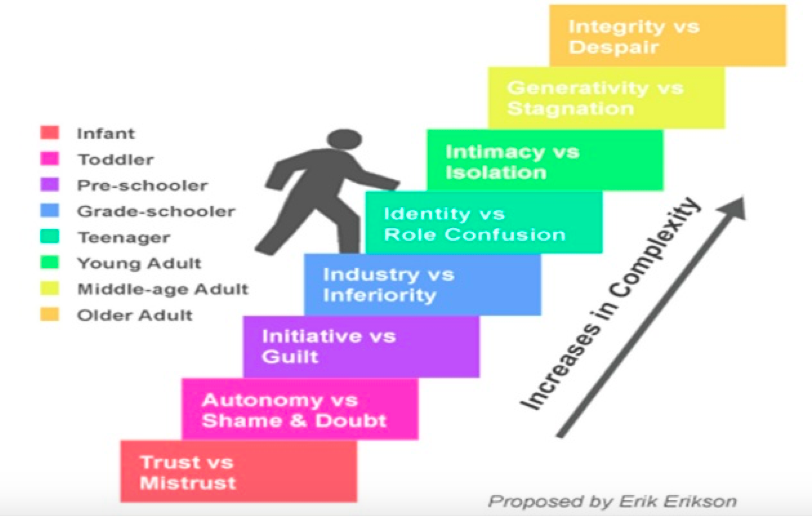Psychological theories are methods to explain specific phenomena, such as the development of personality or the. Human behavior is the result of three component interactions.
Social Development and Working Mothers презентация онлайн
Freud believes that most of our personality has been formed by the time we are five.

Psychosocial theory of personality. Sigmund freud, the father of psychoanalysis, described personality, in part, as comprising three components: Psychosocial development theory is an expansion of sigmund freud’s original five stages of development. At the age of five, a child has gone through the oral, anal, and most of the phallic stages.
The intervention is rooted in the assumption of a pervasive skills de fi cit. Search for the meaning of their lives. All of these suggest that a good gerontological theory should be 'holistic', taking into consideration all factors that.
Erikson later proposed a psychosocial theory of development, suggesting that an individual’s personality develops throughout the lifespan—a departure from freud’s view that personality is fixed in early life. A psychosocial and developmental theory on spirituality and religion is outlined. These characteristics include a person’s behavior, way of thinking and a person’s interaction with the surrounding environment (briggs & peter, 1980).
The first stage of erikson’s theory of psychosocial development occurs between birth and 18 months of age and is the most fundamental stage in life. A psychosocial dynamic personality theory of collective people in premodern society, the individual was not recognized as an independent entity. Beginning in the late 19th century, sir francis galton, a british polymath (an expert in many fields).
The personality of an individual is the unique characteristics that are inherent in a person. Each stage is characterized by certain and very specific internal psychological conflicts. One of the strengths of erikson's theory is its ability to tie together important psychosocial development across the entire lifespan.
Erik erikson’s (1958, 1963) psychosocial development theory proposes that our personality develops through eight stages, from infancy to old age. Thesis statement i will be discussing the psychoanalytic and psychosocial personalities in both men and women and how their upbringing might shape how they are perceived in their environment as they get older in our modern. Identified 16 personality traits that he believed could be utilized to understand and measure individual differences in personality.
It is a theory that can be characterized by 4 key points. The scope of psychological theory is much more limited than that of cognitive science. The psychoanalytic theory of personality is an idea that the personality of an individual will develop in a series of stages.
Psychosocial theory is psychological development in a social. Erikson’s psychosocial theory the psychosocial theory can be explained by examining the stages of personality development. The scope of psychological theory vs cognitive science.
The theory is based on the assumption that there is a core tendency for all people to appreciate, experience, accept, and express a spiritual dimension of life. Erikson divided the growth of the personality into eight psychosocial stages. In a sense, theory gives us a representation of an idea and what the real thing ought to be.
Adapting to societal expectations regarding aging. He argued that social experience was valuable throughout life, with each stage recognizable by the specific conflict we encounter between our psychological needs and the. Because an infant is utterly dependent, the development of trust.
Freud said personality is formed by the process and results of these struggles. The major difference between freud and erikson’s theory is that erikson emphasized psychosocial correlates, whereas freud focused on biological factors. Cultural influences are the primary bases for both neurotic and normal personality development.” (feist, roberts, & feist, 2021, chapter 6, pg.
Theory helps us in terms of expressing ideas of how we view things. Theories of personality personality tests date all the way back to the 18th century, when phrenology, measuring bumps on the skull, and. The decline of cognitive and physiological functioning.
Frederick walborn, in religion in personality theory, 2014. The author has tasked you with preparing an outline for a chapter on the psychoanalytic and psychosocial social theories of personality. Complex physical, social, and psychological challenges present to individuals as they age.
In his theory, erikson emphasized the social relationships that are important at each stage of personality development, in contrast. This assignment allows you to demonstrate how effectively you can compare and contrast psychoanalytic and psychosocial theories of personality. These characteristics are consistent in an individual and.
Skills de fi cits include (1) the capacity to regulate emotions, (2) the ability to. Suggested that there are three dimensions of personality: Although support for erikson's stages of personality development exists (mcadams, 1999), critics of his theory provide evidence suggesting a lack of discrete stages of personality development (mccrae & costa, 1997).
The first four are similar to freud’s oral, anal, phallic, and latency stages.

Jung’s personality theory Explained 4 functions and 8 types

Psychosexual Stages Notes Read

Theories of persoonality. Psychoanalytic theories презентация онлайн
Old Versus New Personality Psychology Personal Intelligence
Theories of Personality big 5, humanistic, temperament YouTube